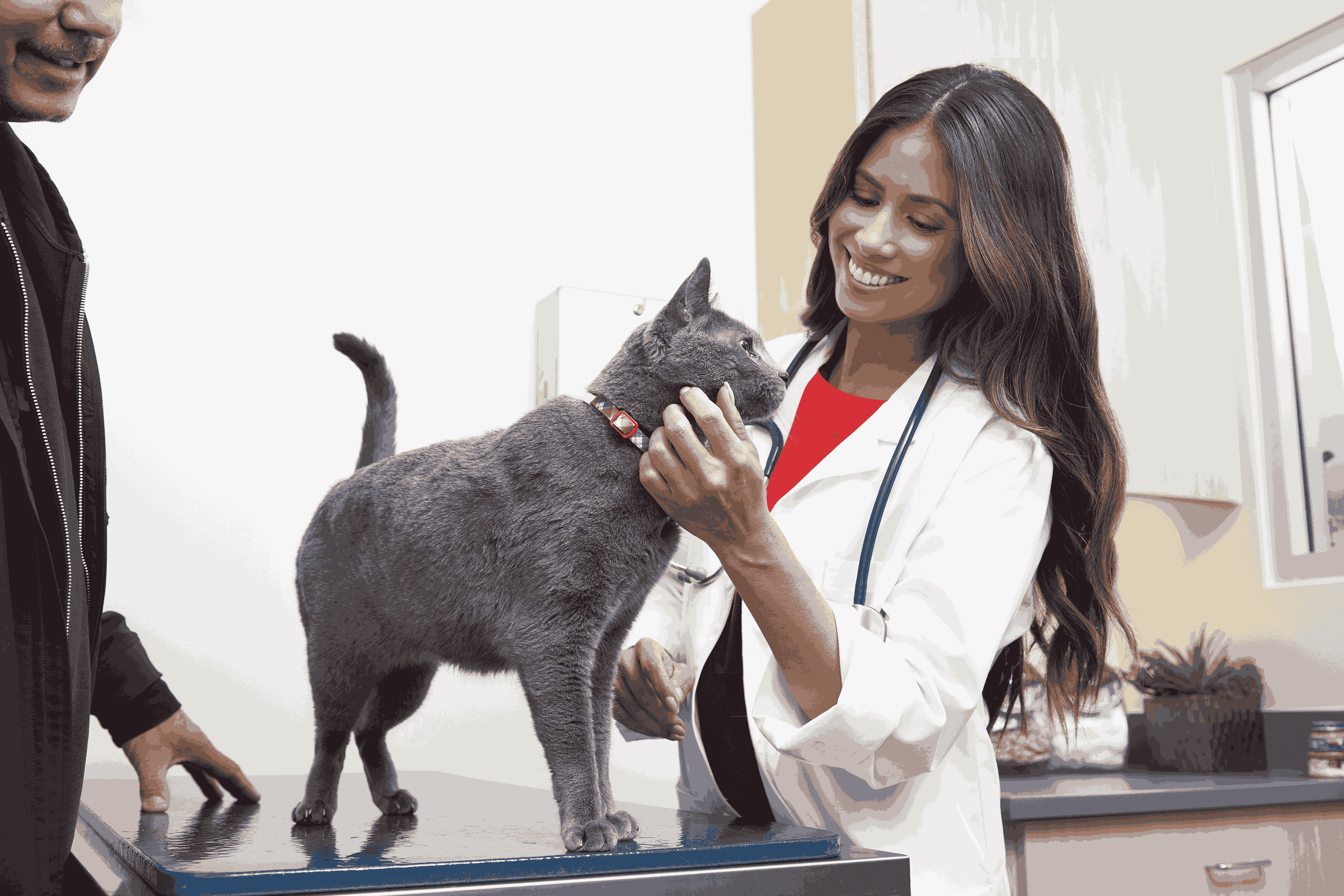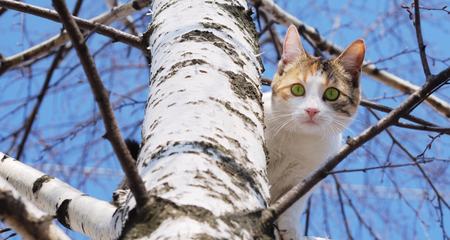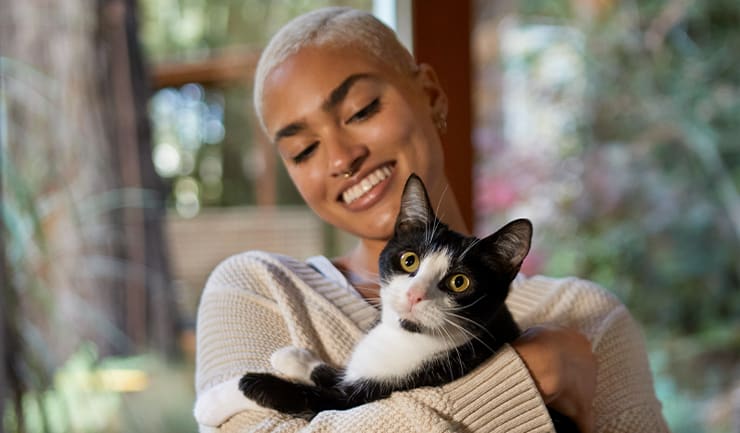Roundworms in Cats
Ascariasis


Summary of Content
SEVERITY:
-
Requires diagnosis by a veterinarian.
-
Resolves within days after treatment
-
Treatable by a veterinarian, and/or the pet parent
-
Regular deworming, proper cleaning and sanitation, rodent control
-
Transmission is possible between animals and between cats and people
-
Diagnosis is generally performed during a physical examination performed by your veterarian, and fecal testing
VERY COMMON IN
Symptoms & Signs
In the intestine, roundworms absorb nutrients from what the animal eats, interfere with digestion, and can damage the lining of the intestine. Animals with mild infestations of roundworms may not show any signs of disease. Animals with more severe infestations may be thin, have dull hair coats, and develop a pot-bellied appearance. Symptoms may include: anemia, decreased appetite, poor growth rate for kittens, vomiting, diarrhea, or constipation. Rarely, in severe infestations, the roundworms can cause obstruction of the intestines. A cough may be observed in some animals due to the migration of the larvae through the respiratory system. In young kittens the migration of the larvae in the lungs can cause pneumonia. Adult roundworms can be seen by the naked eye and may be seen in your cat’s stool or vomit.
Diagnosis
Adult worms are usually three to four inches long and may be seen in the feces or vomit. The worms are round on cross-section and look like spaghetti. The eggs are easily identified in the feces through fecal testing. A flotation solution is used to separate the eggs from the rest of the stool, and the resulting sample is examined microscopically. A very slight difference in appearance of the eggs of roundworms can allow experienced persons to distinguish them from other parasites.
Causation
Roundworms, often called ascarids, are the most common parasite of the digestive tract in dogs and cats. There are two species of roundworms that affect cats: *Toxascaris leonine* and *Toxocara cati*. Because they can cause disease in humans, they are also very important human health concern as well. They are prolific and an infested animal can pass millions of eggs in the feces each day. An animal can acquire a roundworm infection through ingestion of eggs in the environment, ingestion of a transport host (rodents), or by larvae entering the animal while in the uterus or through the mother’s milk. Of the roundworms, *T. leonina* has the simplest life cycle. After an animal ingests infective eggs, the eggs hatch and the larvae mature within the small intestine. The adult female worm lays eggs which are passed in the feces. The eggs become infective after remaining in the environment for at least three to six days. Animals become infected if they eat infected feces or an infected transport host. Roundworms of the species *Toxocara cati* have a more complicated life cycle and a very effective way of making sure its species will be passed from generation to generation. After a cat eats the eggs, they hatch and the larvae enter the wall of the small intestine. The larvae migrate through the circulatory system and either go to the respiratory system or other organs or tissues in the body. If they enter body tissues, they can encyst and remain in the tissues for months or years. This migration is most commonly seen in older cats. In very young kittens, larvae move from the circulation to the respiratory system and are coughed up and swallowed. The larvae mature into adults who lay eggs which are passed out of the animal in the feces. The eggs need to remain in the environment for two weeks before they become infective. If an animal ingests a transport host having encysted larvae, the larvae are released when the transport host is digested and they mature in the intestines. A pregnant cat that has *Toxocara cati* encysted larvae in her tissues can pass them to her kittens in two ways. The larvae that were dormant in her tissues can migrate through the uterus and placenta and infect the fetal kitten. The larvae can also enter the female’s mammary tissue and the kittens can become infected while nursing. A month after a cat eats an infective egg or a kitten with a prenatal infection is born, the adult worm has matured in the animal's intestine and the next generation of eggs are passed.
Treatments
TREATMENT
SUPPORTIVE CARE
MEDICATIONS
DEVICES
SURGERY
SPECIALISTS
Cost Of Treatment
Cost of treatment will vary widely by location and will often include costs such as an exam fee and fecal testing which your local vet can often provide a quote for before your appointment. Roundworm infection can oftentimes be treated for under $50 per cat. Monthly prevention may cost as little as $10-$20 per dose.
Recovery
Cats with roundworms usually recover quickly if identified early with proper treatment.
Monitoring
Fecal exams can help detect what parasites a pet may have and how the pet should be treated. A fecal examination should be performed four to eight weeks after the last treatment of an infestation. A fecal exam should also be performed at a pet's annual exam and up to three or more additional times per year depending on the risk of exposure.
Prevention
Many heartworm preventions such as Revolution, Advantage Multi, Heartgard, and Interceptor treat and control infections with roundworms and are an important addition to a prevention program. Look at your preventive package to check its efficacy against roundworms. Any feces in yards should be picked up on a daily basis. The eggs of roundworms are extremely resistant to environmental conditions and can remain infective in the soil for months to years. Pets need to be discouraged from ingesting feces or anything contaminated with infective eggs. Floors in kennels should be impervious so they are easier to clean. Roundworm eggs are resistant to most disinfectants. but are susceptible to extreme heat. Be sure to follow CDC guidelines on wearing proper personal protection equipment (PPE), laundering clothing or bedding that cannot be discarded in hot soapy water, follow measures needed to safely disinfect the area using boiling water. For large kennels or large spaces that are not flammable, your local fire department would need to assist you in the event a blowtorch is the most efficient way to proceed with disinfection. Always thoroughly wash hands after disinfection, even when disposable gloves are worn. Since mice and other rodents can serve as transport hosts, their control is important. Remember there are a number of humane live traps that can be utilized. Mouse and rat poisons are poisons for dogs, cats, and other animals as well. If one of these products is used in a location your pet may visit, follow the manufacturer's recommendations and prevent access by your pets. Pets should be prevented from scavenging and preying on wildlife. If your pet consumes part or all of a deceased animal you suspect passed away from poison exposure, seek veterinary attention or contact the Pet Poison Hotline immediately.
Disclaimer
The information contained on this page is for educational purposes only. Treatment should only be provided under the advice of a veterinarian who has examined your pet under the laws applicable to your state of residence.

Two Easy Ways to Start Earning Rewards!
Become a member today!Members-only pricing and offers, personalized care notifications, Vital Care points back on every purchase and more!Become a credit card member today!
Earn 2X Pals Rewards points at Petco
when you use Petco Pay!APPLY NOWLearn More About Petco Pay Benefits





